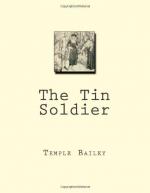“And because he doesn’t want her out of his sight, she must stay a prisoner. I say that he hasn’t done anything to deserve such devotion, Drusilla. He hasn’t done anything to deserve it.”
“You are jealous.”
“No. It isn’t that. Though I’ll confess that something pulls at my heart when I think of it—. But I want her to be happy.”
“I think she is happy. Life is giving her the hard things—but you and I would not be without the—hard things; we have reached out our hands for them, because the world needs us. Are you going to deny your daughter that?”
“Oh, I suppose not. But I hate it. Women ought to be happy—care-free, not shut up in sick rooms or running around in the rain.”
“Oh, you men, how little you know what makes a woman happy.” She stopped, and half rose from her chair. “Captain Hewes is coming.”
“I don’t know that I am glad, Drusilla,” the Doctor turned to survey the beaming officer, “for now you won’t have eyes or ears for me.”
But she was glad.
While the Captain held her hand in his as if he would never let her go, she told him about being fluted and starched. “I don’t look as dishevelled as I did the other day.”
“You looked beautiful the other day,” he assured her with fervor, “but this is better, because you are rested and some of the sadness has gone out of your eyes.”
Dr. McKenzie watched them enviously, “I realize,” he reminded them, “that I am the fifth wheel, or any other superfluous thing, but you can’t get rid of me. I am homesick—somebody’s got to cheer me up.”
“We don’t want to get rid of you,” Drusilla told him, smiling.
But he knew that her loveliness was all for the Captain. She was lighted up by the presence of her betrothed, made exquisite, softer, more womanly. Love had come slowly to Drusilla, but it had come at last.
When the Doctor left them, he was in a daze of loneliness. He wanted Jean, he wanted sympathy, understanding, good-comradeship.
For just one little moment temptation assailed him. There was of course, Hilda. She would bring with her the atmosphere of familiar things which he craved. There would be the easy give and take of speech which was such a relief after his professional manner, there would be his own teasing sense of how much she wanted, and of how little he had to give. There would be, too, the stimulus to his vanity.
A broken-hearted Hilda, Drusilla had said. There was something provocative in the situation—elements of drama. Why not?
He thought about it that night when once more back at his work he and his head nurse discussed a case of shell shock—a pitiful case of fear, loss of memory, complete prostration.




